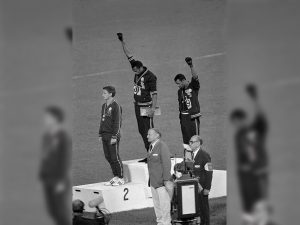
There are moments in which the collision between sports and politics seems unavoidable. This year, the Olympics is no exception due to the political climate of the last two years. Although the current Olympic Charter explicitly states that, “No kind of demonstration or political, religious or racial propaganda is permitted in any Olympic sites,” this has become a trademark practice of athletes from all over the world. Despite this, the political ties the Olympics has will continue to exist as long as the competition itself continues. The history of politics and the competition can be traced back to 1936 in Berlin where Jesse Owens won four gold medals in Hitler’s presence. Fast forward 82 years to Pyeongchang, and groups of skeptical South Korean citizens are protesting the Olympic committee’s decision to appear in the opening ceremony under one flag. People from South Korea, however, are not the only ones currently disappointed with their government. In the last two years, protests in the US have been frequently occurring, and thus it is no surprise that an American athlete has made a strong political statement in the Olympics this year.
On Wednesday, Feb. 7, it was reported that Vice President Mike Pence invited the first openly gay figure skater, Adam Rippon, for a meeting after Pence became aware of Rippon’s comments in an interview with USA Today last month. “I would absolutely not go out of my way to meet somebody who I felt has gone out of their way to not only show that they aren’t a friend of a gay person but that they think that they’re sick,” Rippon said regarding meeting with Pence during the traditional meet-and-greet with the US delegation. As expected, Rippon, who became the first openly gay figure skater after declaring his sexuality in an interview with Skating Magazine back in 2015, declined Pence’s request. The reason why Pence would want to meet with Rippon seems odd in the first place. Pence has been viewed as an opponent to the LGBT community after reportedly supporting “conversion therapy” for gay people and by signing the controversial Religious Freedom Act in 2015, which was viewed as a way for businesses to discriminate against people based on their sexual orientation.
After the inauguration of the Olympics in Pyeongchang two weeks ago, the world’s attention has shifted to all the athletes competing there. Many will probably criticize Rippon for not being politically correct and therefore, Rippon’s denial to meet with Pence (who himself refused to applaud the unified Korea team as they walked out during the inauguration) will gather even more attention during the competition. His protest is justified by the history of protests at the Olympics, the most notable being in Mexico 1968 when Tommie Smith and John Carlos removed their shoes and held up their fists while wearing black gloves during the national anthem. If Smith and Carlos were able to protest their disapproval of the US at the time, then Rippon should be able to demonstrate his advocacy for gay rights by refusing to meet with Pence in South Korea.
After Smith and Carlos’ protest, many athletes and nations have taken advantage of the attention the Olympic games receives to make political statements. Although Smith and Carlos received heavy criticism from many Americans, including the famous Jesse Owens, they also made a huge impact, which was followed by more athletes protesting for their beliefs on the international stage. Protests and political statements, which are officially banned by the International Olympic Committee, have happened at the games for many years and they won’t cease as long as the Olympics continue to exist. Therefore, Rippon won’t be an exception since it is his right to protest in any way he wishes to do so. However, he should also be prepared for consequences and criticism — both negative and positive — upon returning home after the Olympics.
This year marks the 50th anniversary of the most notable protest in the Olympics. This year also marks the most contentious that the Olympic games have been in years. The Olympics are political, and as long as the torch is lit up every two years for the winter and summer games, there will be always be a deeper meaning behind what is being witnessed.








